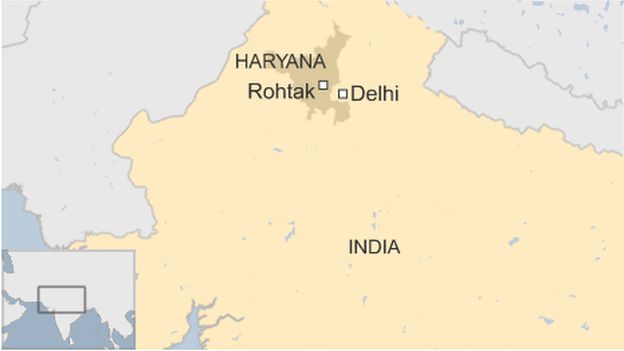Mr. Bailey's 1st Block IR-GSI Class blog focused on the current events of South and Central Asia
Wednesday, February 24, 2016
Passenger plane goes missing in Nepal with 21 on board
Tara Air said rescue helicopters had been deployed to search for the Twin Otter aircraft, which lost contact with air traffic control eight minutes after it left the western town of Pokhara in the morning.
"A plane that took off from Pokhara for Jomsom this morning is out of contact," Tara Air spokesman Bhim Raj Rai told AFP.
"There are 18 passengers, including two foreigners, and three crew members, on board."
Jomson is a popular trekking destination in the Himalayas about 20 minutes' flight from Pokhara, which lies 225 km west of Kathmandu.
Nepal, which is still reeling from a devastating earthquake last April, has suffered a number of air disasters in recent years, dealing a blow to its tourist industry.
Most have been attributed to inexperienced pilots, poor management and inadequate maintenance.
The country's aviation sector has come under fire from international authorities and in 2013 the European Union banned all Nepalese airlines from flying there.
Iran’s families minister concerned after village’s entire male population executed
In recent weeks, assailants lobbed grenades at the offices of three television news channels, claiming they were acting for Islamic State. A pamphlet at the scene of one blast warned media to “stop siding with the apostate army and government of Pakistan.”
In the eastern province of Punjab, police in December said they detained 30 people—many disaffected members of other militant groups—suspected of banding together and seeking to join Islamic State. A senior security official there said they wanted to “rebrand” themselves.
On Friday, three police officers on patrol were shot dead in the city of Faisalabad in Punjab. Again, pamphlets left at the scene claimed Islamic State was responsible. Local security officials said it was unclear if the gunmen were really connected to the terrorgroup.
Islamabad says there is no evidence Islamic State has an organized presence or is orchestrating and carrying out attacks in nuclear-armed Pakistan. But government officials warn that the jihadist group’s territorial conquests in the Middle East are a potential draw for new recruits when the army and police are struggling to suppress terror.
“The real threat to us is the ideological appeal, as well as the high profile the group has gained,” said the senior official in Punjab, who declined to be identified. “We’re trying to nip this in the bud, catch people before they are in a position to carry out any attacks.”
The head of Pakistan’s Intelligence Bureau, Aftab Sultan, told lawmakers in a closed-door briefing earlier this month that hundreds of Pakistanis had joined Islamic State fighters in Syria and Iraq, according to people who were present. That would be far fewer than are suspected to have gone from France.
One reason experts say more haven’t left to fight abroad is that Pakistan has such a large number of domestic jihadist groups to absorb those radicalized. Officials worry Pakistan’s long history of extremism could provide especially fertile ground for Islamic State. The country already has entrenched Sunni groups whose hatred of minority Shiite Muslims mirrors that of Islamic State.
“Young jihadists who think their groups don’t take enough action, and see Daesh punching at a global level, find it inspirational,” said Omar Hamid, a London-based security expert with consulting company IHS Inc. and former Karachi police counterterror officer, using an Arabic name for Islamic State.
And that, police in Karachi say, is translating into bloodshed. In May, gunmen in Karachi, Pakistan’s commercial capital, walked down the centeraisle of a bus carrying Shiites, methodically shooting its passengers and killing 43 people. The attackers left behind pamphlets lauding Islamic State.
Victims’ family members consoled one another after an attack on a bus in Karachi on May 13, 2015. Gunmen boarded the bus and opened fire on passengers, killing 43 people. ENLARGE
Victims’ family members consoled one another after an attack on a bus in Karachi on May 13, 2015. Gunmen boarded the bus and opened fire on passengers, killing 43 people. PHOTO: AKHTAR SOOMRO/REUTERS
Authorities say they believe the assault was a gruesome audition of sorts by a terror cell composed of educated and relatively affluent Pakistani extremists—one of whom was a former Unilever PLC manager—that hoped to win favor with the jihadist group.
The group, many of whom formerly belonged to al Qaeda, wanted “to show Daesh what they can do,” said Raja Umar Khattab, a senior Karachi counterterrorism police officer.
Police arrested eight suspected leading members of the cell, which they allege was also behind the assassination of a liberal activist and the shooting of an American health worker in Karachi. They were handed over to the military last month for trial in military courts controversially established last year to try terrorism cases.
The Karachi cell was receiving support, security officials said, from Brohi Baloch—the brother of Ramzi Yousef, convicted in the U.S. of the 1993 bombing of the World Trade Center in New York. Cell members visited his hideout in the western province of Balochistan, officials said.
Officials say most drawn to Islamic State appear to be operating independently, like Tashfeen Malik, a Pakistani national, and her husband, an American of Pakistani heritage, who killed 14 people in a shooting spree in California in December and pledged loyalty to Islamic State.
Islamic State named a former Pakistani Taliban militant, Hafiz Saeed Orakzai, to head its operations in Afghanistan and Pakistan, but he is based in Afghanistan.
RELATED COVERAGE
In Pakistan, Extremist Group Expands Its Reach
Tashfeen Malik Studied at Conservative Religious School in Pakistan
Gunmen Ambush Bus in Karachi, Killing Dozens
Investigators probing the Karachi bus attack concluded in a report that the participants had been seeking to contact Islamic State, but said there was “no direct linkage/flow of instructions” between the two groups.
The Karachi cell had 20 to 25 alleged members. Among them, police said: Saad Aziz, a 27-year-old graduate of one of Pakistan’s two top business schools, Karachi’s Institute of Business Administration, who ran a family-owned Mexican-food and burger joint called Cactus. Muhammad Farooq, a lawyer for Mr. Aziz, said his client has denied all allegations against him. Mr. Aziz’s family says he was asleep at home on the morning of the bus attack, said Mr. Farooq.
In addition to the bus massacre, Mr. Aziz is accused of killing Sabeen Mahmud, a human-rights activist who ran a Karachi arts center and hosted political talks, for her liberal views and opposition to the Taliban.
Ms. Mahmud was shot just after she hosted a talk on human-rights abuses by Pakistani armed forces in Balochistan, leading many to accuse the military of being behind the killing. The military denied any involvement.
Police say Mr. Aziz was initially recruited to join al Qaeda by Ali Rehman, a Pakistani employee of Unilever, whom he met while doing an internship. Unilever declined to comment. Police allege Mr. Rehman, a graduate of Pakistan’s top engineering college, took part in both the killing of Ms. Mahmud and the bus attack. Police say he is at large.
One of the alleged financiers of the Karachi cell ran an accountancy-training college in the city, while the wives of several members were active in spreading its ideology and raising funds, police say. The alleged leader is thought by police to have fled to Afghanistan or Syria.
Several members of the cell in previous years had attended lectures of Tanzeem-e-Islami, a proselytizing group established in 1962 that calls for the establishment of a caliphate, a transnational Islamic government, police said.
Islamic State declared it had established a caliphate in 2014.
Syed Azher Riaz, a spokesman for Tanzeem-e-Islami, said the group is opposed to creating a caliphate through violent means. But, he said, “Democracy is not suitable for bringing an Islamic system.”
Pakistan Frets Over Potential Appeal of Islamic State
In recent weeks, assailants lobbed grenades at the offices of three television news channels, claiming they were acting for Islamic State. A pamphlet at the scene of one blast warned media to “stop siding with the apostate army and government of Pakistan.”
In the eastern province of Punjab, police in December said they detained 30 people—many disaffected members of other militant groups—suspected of banding together and seeking to join Islamic State. A senior security official there said they wanted to “rebrand” themselves.
On Friday, three police officers on patrol were shot dead in the city of Faisalabad in Punjab. Again, pamphlets left at the scene claimed Islamic State was responsible. Local security officials said it was unclear if the gunmen were really connected to the terrorgroup.
Islamabad says there is no evidence Islamic State has an organized presence or is orchestrating and carrying out attacks in nuclear-armed Pakistan. But government officials warn that the jihadist group’s territorial conquests in the Middle East are a potential draw for new recruits when the army and police are struggling to suppress terror.
“The real threat to us is the ideological appeal, as well as the high profile the group has gained,” said the senior official in Punjab, who declined to be identified. “We’re trying to nip this in the bud, catch people before they are in a position to carry out any attacks.”
The head of Pakistan’s Intelligence Bureau, Aftab Sultan, told lawmakers in a closed-door briefing earlier this month that hundreds of Pakistanis had joined Islamic State fighters in Syria and Iraq, according to people who were present. That would be far fewer than are suspected to have gone from France.
One reason experts say more haven’t left to fight abroad is that Pakistan has such a large number of domestic jihadist groups to absorb those radicalized. Officials worry Pakistan’s long history of extremism could provide especially fertile ground for Islamic State. The country already has entrenched Sunni groups whose hatred of minority Shiite Muslims mirrors that of Islamic State.
“Young jihadists who think their groups don’t take enough action, and see Daesh punching at a global level, find it inspirational,” said Omar Hamid, a London-based security expert with consulting company IHS Inc. and former Karachi police counterterror officer, using an Arabic name for Islamic State.
And that, police in Karachi say, is translating into bloodshed. In May, gunmen in Karachi, Pakistan’s commercial capital, walked down the centeraisle of a bus carrying Shiites, methodically shooting its passengers and killing 43 people. The attackers left behind pamphlets lauding Islamic State.
Victims’ family members consoled one another after an attack on a bus in Karachi on May 13, 2015. Gunmen boarded the bus and opened fire on passengers, killing 43 people. ENLARGE
Victims’ family members consoled one another after an attack on a bus in Karachi on May 13, 2015. Gunmen boarded the bus and opened fire on passengers, killing 43 people. PHOTO: AKHTAR SOOMRO/REUTERS
Authorities say they believe the assault was a gruesome audition of sorts by a terror cell composed of educated and relatively affluent Pakistani extremists—one of whom was a former Unilever PLC manager—that hoped to win favor with the jihadist group.
The group, many of whom formerly belonged to al Qaeda, wanted “to show Daesh what they can do,” said Raja Umar Khattab, a senior Karachi counterterrorism police officer.
Police arrested eight suspected leading members of the cell, which they allege was also behind the assassination of a liberal activist and the shooting of an American health worker in Karachi. They were handed over to the military last month for trial in military courts controversially established last year to try terrorism cases.
The Karachi cell was receiving support, security officials said, from Brohi Baloch—the brother of Ramzi Yousef, convicted in the U.S. of the 1993 bombing of the World Trade Center in New York. Cell members visited his hideout in the western province of Balochistan, officials said.
Officials say most drawn to Islamic State appear to be operating independently, like Tashfeen Malik, a Pakistani national, and her husband, an American of Pakistani heritage, who killed 14 people in a shooting spree in California in December and pledged loyalty to Islamic State.
Islamic State named a former Pakistani Taliban militant, Hafiz Saeed Orakzai, to head its operations in Afghanistan and Pakistan, but he is based in Afghanistan.
RELATED COVERAGE
In Pakistan, Extremist Group Expands Its Reach
Tashfeen Malik Studied at Conservative Religious School in Pakistan
Gunmen Ambush Bus in Karachi, Killing Dozens
Investigators probing the Karachi bus attack concluded in a report that the participants had been seeking to contact Islamic State, but said there was “no direct linkage/flow of instructions” between the two groups.
The Karachi cell had 20 to 25 alleged members. Among them, police said: Saad Aziz, a 27-year-old graduate of one of Pakistan’s two top business schools, Karachi’s Institute of Business Administration, who ran a family-owned Mexican-food and burger joint called Cactus. Muhammad Farooq, a lawyer for Mr. Aziz, said his client has denied all allegations against him. Mr. Aziz’s family says he was asleep at home on the morning of the bus attack, said Mr. Farooq.
In addition to the bus massacre, Mr. Aziz is accused of killing Sabeen Mahmud, a human-rights activist who ran a Karachi arts center and hosted political talks, for her liberal views and opposition to the Taliban.
Ms. Mahmud was shot just after she hosted a talk on human-rights abuses by Pakistani armed forces in Balochistan, leading many to accuse the military of being behind the killing. The military denied any involvement.
Police say Mr. Aziz was initially recruited to join al Qaeda by Ali Rehman, a Pakistani employee of Unilever, whom he met while doing an internship. Unilever declined to comment. Police allege Mr. Rehman, a graduate of Pakistan’s top engineering college, took part in both the killing of Ms. Mahmud and the bus attack. Police say he is at large.
One of the alleged financiers of the Karachi cell ran an accountancy-training college in the city, while the wives of several members were active in spreading its ideology and raising funds, police say. The alleged leader is thought by police to have fled to Afghanistan or Syria.
Several members of the cell in previous years had attended lectures of Tanzeem-e-Islami, a proselytizing group established in 1962 that calls for the establishment of a caliphate, a transnational Islamic government, police said.
Islamic State declared it had established a caliphate in 2014.
Syed Azher Riaz, a spokesman for Tanzeem-e-Islami, said the group is opposed to creating a caliphate through violent means. But, he said, “Democracy is not suitable for bringing an Islamic system.”
Economic Distress Fuels Caste Protests in India
So far, 19 people are confirmed to have died in the protests. Freight trains and buses were set on fire, as were at least seven railway stations, and hundreds of people had to flee their homes.
These shocking protests have come from a seemingly unlikely source. The Jats of north India are traditionally a farming community. In the state of Haryana, where the protests are concentrated, Jats are the dominant landowning caste. Since independence, they have been able to use their dominance over the ownership of land to wield influence in politics and other sectors of the economy; today, they are without doubt the single most powerful community in the state.
FILE - In this Friday, Feb. 27, 2015 file photo, Hindu men from the village of Nandgaon throw colored powder at each other before joining a procession for the Lathmar Holi festival at the legendary hometown of Radha, consort of Hindu God Krishna, in Barsana, 115 kilometers (71 miles) from New Delhi, India. During Lathmar Holi the women of Barsana beat the men from Nandgaon, the hometown of Krishna, with wooden sticks in response to their teasing. (AP Photo/Saurabh Das, File)
India in Photos
EXPAND GALLERY
So why then are the Jats asking for reservations in public sector jobs, usually a form of positive discrimination reserved for the socially and economically disadvantaged castes?
Left behind
The Jats of Haryana have been hit hard by the decline of agriculture both as a source of income and as a source of social status in the last two decades – and they are only the most recent farming community that has agitated for reservations. The Patidars in Gujarat and the Kapus in Andhra Pradesh have adopted a similar strategy in the last few months. The Marathas in Maharashtra might be next – especially if the government of Haryana grants reservations to the Jats, which it seems inclined to do.
After more than 20 years of economic stagnation, India’s agricultural sector, which still employs the majority of the population, is in crisis. Sluggish growth, increasing competition from abroad and fragmentation of landholdings across generations – the average size of a field shrunk by over 60% in the last four decades – have left a trail of extreme rural distress throughout the country. The suicides of nearly 300,000 farmers in the last two decades are some indication of the depth of despair.
Farming castes, then, have gradually seen their economic and social status declining. In many cases, the most dynamic sections of the community have expanded their economic interests outside agriculture. The Jats of Haryana are an example, and they now dominate other sectors of the economy as well. However, the shift towards the urban sectors of the economy does not involve the totality or even the majority of the community.
This is all compounded by the Indian economy’s failure to generate enough jobs for one of the fastest-growing working-age populations in the world.
Jobless growth
Between 2004 and 2009, only 25 million jobs in total were created in non-agricultural sectors – this against an estimated need of 17 million jobs a year. Although there are some signs of improvement, the Indian economy is still unable to generate enough work, especially in the formal sector – that is, formally listed organisations that pay tax – which employs just 7 percent of the country’s workforce.
[Learn more about India.]
This jobless growth makes it extremely difficult for young people to board the train of India’s economic miracle. Especially for those belonging to dominant communities such as the Jats, being left behind is something hardly easy to stomach.
To make things worse, Haryana has one of the most unequal sex ratios in the country, with only 879 women per 1,000 men – it is increasingly difficult for young men to find a bride. In some north Indian states, women are literally imported from other parts of the country to meet the demand for brides. It is clear then that, in a context where the overwhelming majority of marriages are arranged, families prefer to marry their daughters to men employed in the formal economy.
The declining status of agriculture is making this more difficult for the Jats and other farming communities. The fact that people from other castes, even ones lower in the hierarchy, have government jobs and can marry more easily is, again, not easy to stomach.
It seems the government of Haryana will agree to the Jats’ demands, but that will hardly mean the end of economic caste conflicts. Other farming castes throughout the country will feel discriminated against and might well resort to protests of their own. And as per a Supreme Court order, no more than 50 percent of the available jobs can be reserved for particular groups. Therefore, including an additional community means eroding the available jobs for those who already are on the list.
Haryana’s Ahirs, Gujjars and Lodhas are on the warpath. The Indian government should be very careful before opening the Pandora’s box of job reservations once again.
Tuesday, February 23, 2016
Two India 'sedition' students surrender to police
Iran media increases bounty for killing Britain’s Salman Rushdie
Iranian state-run media outlets have added $600,000 to a bounty for the killing of British author Salman Rushdie imposed in 1989 over the publishing of his book “The Satanic Verses”.
Iran's election campaigns
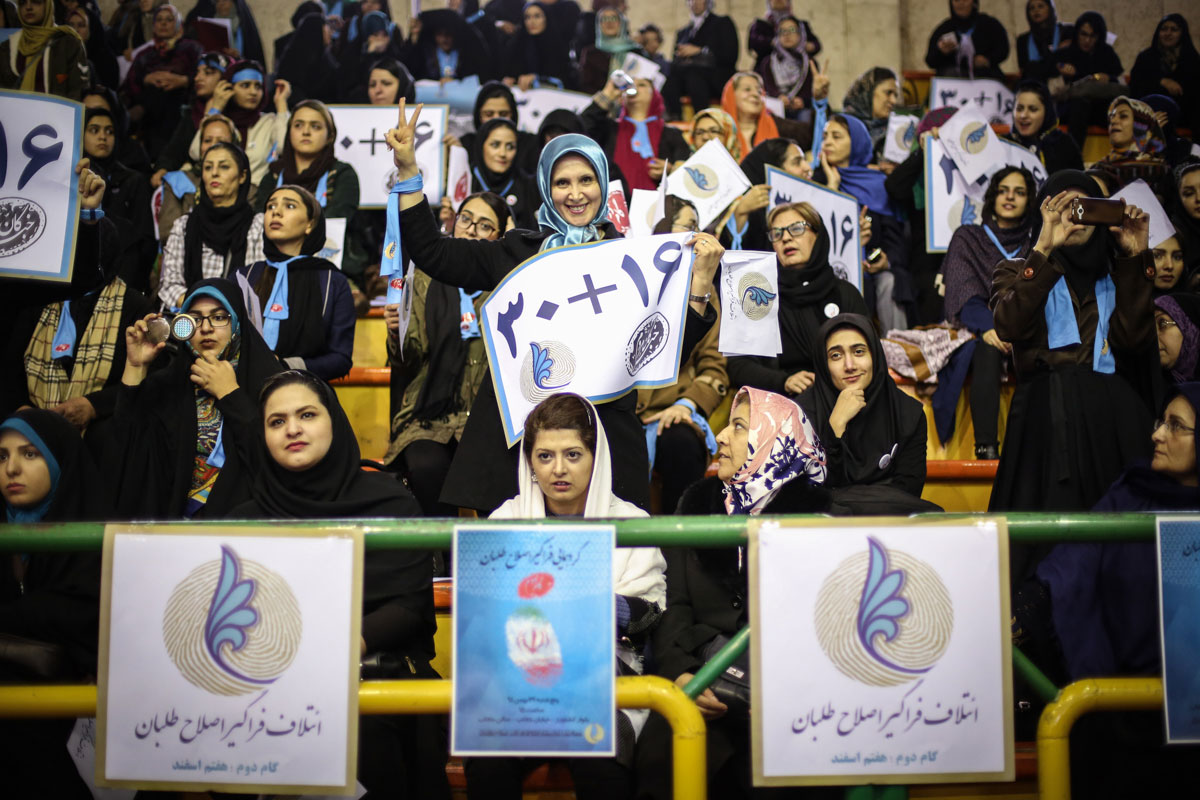



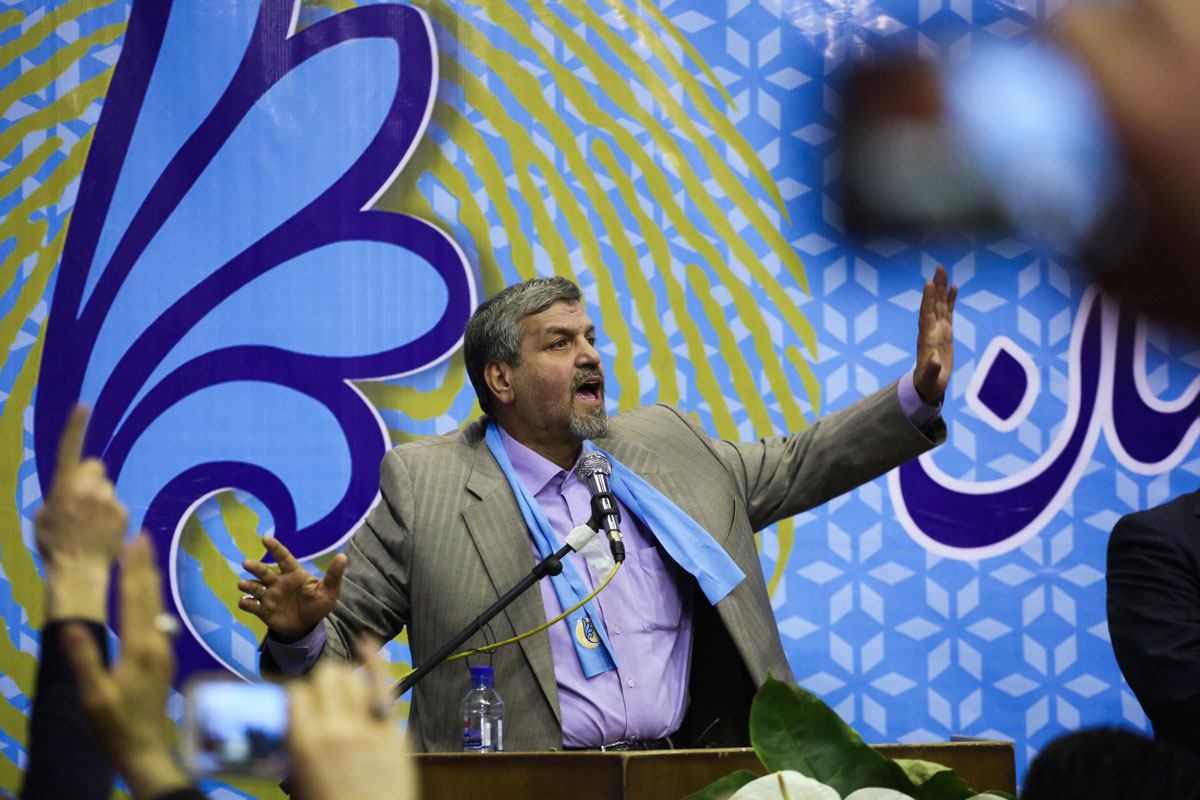




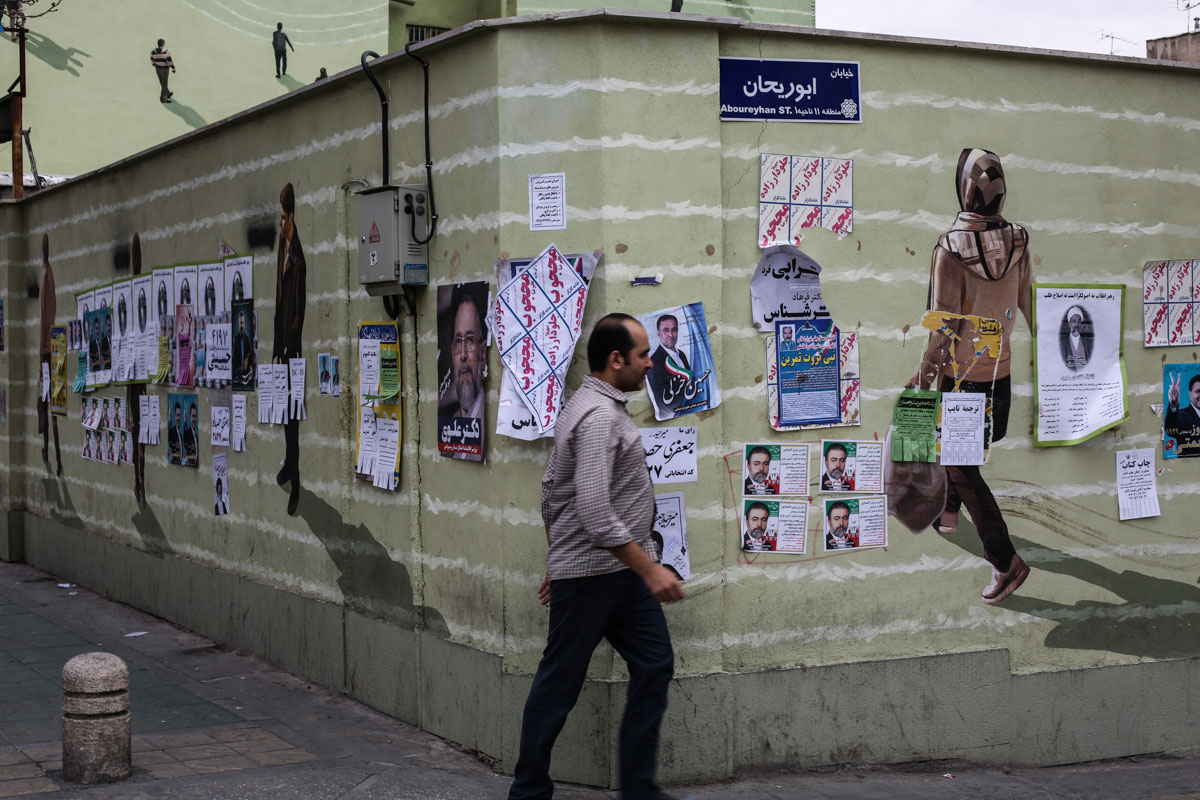
Nepal PM seeks to strengthen India ties with visit
Experts say the visit from Friday - the first foreign trip by Khadga Prasad Sharma Oli as prime minister - indicates that relations between the two nations are getting back on track.
Relations deteriorated after India asked Nepal to amend the constitution adopted last September to address the grievances of historically marginalised groups such as Madhesis.
"This is a kind of goodwill visit. The distrust that was generated should be removed. That should be the objective of the prime minister's visit," Lokraj Baral, a former ambassador to India, told Al Jazeera.
 |
The visit comes a week after a blockade of nearly five months on the India-Nepal border was lifted.
The trade stoppage resulted in a severe shortage of fuel and essential supplies.
The landlocked Himalayan nation almost entirely depends on India for fuel and other essential items such as medicines.
Lifting of blockade
Nepal accused India of interfering in its internal matters and imposing an unofficial blockade - a charge India has denied.Anti-India and anti-Madhesi sentiment runs high in Nepal as India backed the demands of the Madhesi people, who say the new charter does not address their political and economic marginalisation.
The current coalition government, led by Oli's Communist Party of Nepal, passed amendments that they said would address the demands of the Madhesi, who share close cultural and familial bonds with people across the border in India.
 |
|
Nepali PM makes first foreign trip to India
|
He will meet his Indian counterpart Narendra Modi on February 20 but analysts say that no big ticket announcement is going to be made.
"He is not going to sign anything this time because this is not the correct time to do so. Agreements can only be reached on some positive things such as developmental things," Baral, the former diplomat, told Al Jazeera.
Ranjit Rae, the Indian ambassador to Nepal, said the trip would help normalise relations.
Prashant Jha, a senior journalist based in New Delhi, told Al Jazeera: "The anti-Indian rhetoric of the Nepali politicians is hypocritical."
He said "the two countries were taking steps to normalise relations in the past two months".
"What we have seen in the last two months is that steps were being taken to slowly restore the...relationship. Kathmandu took the first step - the foreign minister [Kamal Thapa] came twice to New Delhi with proposals to address the political problems," said Jha, who has covered Nepali politics for more than a decade.
"I think the PM's visit definitely indicates that bilateral relations are getting back on track."
Fragile relationship
Jha said the diplomatic rapprochement is still fragile as the political issues that led to the blockade have not yet been fully addressed.
 |
|
India-Nepal border opens after months of unrest
|
Oli plans to visit Mumbai, India's financial capital, to meet business leaders as his country is in desperate need of investment in infrastructure and the industrial sector.
However, Jha says the domestic situation is not conducive for investment in Nepal.
He said aid given by the Indian government earlier had yet to be utilised.
"There is already a $1bn line of credit announced by Modi in 2014 and another $1bn by India for quake reconstruction," he said.
"The Nepalese state has not used the assistance that has already been promised. Either it does not have the absorptive capacity or due to institutional dysfunction and instability, they have not been able to absorb."
Delhi water crisis may last 15 days after caste protest
The Jat caste called off their days-long protest on Monday after they accepted a deal offered by the government in the northern state of Haryana, following days of riots, arson and looting that saw thousands of troops deployed to the state.
READ MORE: India caste protesters accept government offer
Senior water board official Neeraj Semwal said on Tuesday that only four of New Delhi's nine water treatment plants were currently operating, forcing rationing of supplies to many areas.
"We are hoping to restore partial services in the next two to three days and 100 percent supply within the next 15 days," Semwal told the AFP news agency.
New Delhi's water board is trying to restore full supplies to the city of 17 million people that relies heavily on a canal running through Haryana.
'Districts severely affected'
Water trucks fanned out on Tuesday across the teeming, landlocked city, where infrastructure struggles at the best of times, but it was not clear just how many people were still affected.
"North, west and south Delhi districts were severely affected by the water shortage, with thousands of households not getting regular water supplies," Semwal said.
Delhi Water Minister Kapil Mishra tweeted that the crisis was "not over yet" and urged residents to conserve water.
"More than 50 percent of Delhi’s water comes from this particular canal. Water is slowly coming back, but there is still a widespread water shortage," said Al Jazeera’s Divya Gopalan, reporting from New Delhi.
India sent troops to secure the canal after protesters demanding a quota for their Jat caste in public service jobs and higher education seized it on Saturday and diverted the water flow away from the capital.
Although schools and many businesses reopened on Tuesday as supplies were partially restored, many are still suffering after the water board said it had been forced to limit supplies.
"The situation has calmed down, but we still hear that some people are afraid to leave their homes as they think that riots can break out again," Gopalan said.
A political ally of Indian Prime Minister Narendra Modi was shouted down on Tuesday by a crowd angered by rioting in Haryana.
The chief minister of Haryana, Manohar Lal Khattar, was heckled by local people in the town of Rohtak, northwest of the capital, after they objected to his comments promising that they would receive compensation.
Pampore gunfight ends after 48 hours, three militants shot dead
“Security forces have killed three militants in the JKEDI (Jammu and Kashmir Entrepreneurship Development Institute) complex in Pampore town and their bodies have been recovered.
“Firing exchanges have stopped and room-to-room searches of the multi-storeyed building where the militants were hiding are going on,” a senior police officer told IANS here.
The 48-hour long gunfight between a group of heavily-armed guerrillas and security forces had started on Saturday when guerrillas attacked a Central Reserve Police Force (CRPF) bus at Sempora (Pampore) on the Srinagar-Jammu national highway.
Two CRPF troopers identified as head constable Bhola Prasad and driver constable R.K.Rana had died in that attack, and the assailants had fled to the nearby JKEDI complex for shelter.
Security forces immediately surrounded the complex, but the operation against the guerrillas was started only after around 120 trainees and staff members were safely evacuated from the complex.
The army took over the operation against the guerrillas, believed to belong to Lashkar-e-Taiba (LeT) outfit, with a group of specially-trained para commandos being brought in to flush them out.
However, two officers of the elite Para Regiment – Capt. Pawan Kumar of 10 Para and Capt. Tushar Mahajan of 9 Para regiment – who were leading from the front were killed in the operation after they entered the multi-storeyed building which guerrillas were using as a fortified bunker.
Captain Kumar belonged to Haryana’s Jind district in Haryana while Captain Mahajan belonged to Udhampur town in the Jammu region.
Another commando identified as Lance Naik Om Prakash was injured in the operation and succumbed in hospital on Sunday.
A civilian, Abdul Gani Mir of Gundipora village in Pulwama district, who worked as a gardener at the institute was also killed in the gunfight.
As may as 15 other security personnel including an assistant commandant of the CRPF have been injured in the gunfight and are being treated in hospital.
At least 15 protesters were injured in Pampore town on Monday in clashes with security forces.
The protesters had defied curfew-like restrictions and were trying to carry out a march towards the site of the gunfight.
Prachanda: Nepal's era of change after 'People's War'
Kathmandu, Nepal: Nepal completed its democratic transition last September, when it passed its long delayed constitution.
The Himalayan nation has entered a new era of politics 20 years after Maoist fighters launched an armed rebellion that finally resulted in the removal of 240-year-old monarchy in 2008.
The South Asian nation of 28 million people has just come out of political and economic crisis after five months of anti-constitutional protests by Madhesi parties, who want more economic and political rights.
The Maoist party was credited with the biggest political change, but they have been accused of compromising their core ideologies after coming to power.
Al Jazeera sat with Maoist party chief Pushpa Kamal Dahal or "Prachanda" - the second most powerful politician after Prime Minister Khadga Prasad Sharma Oli - at his home in Kathmandu to hear his views on a range of issues facing Nepal.
Al Jazeera: You have said that the new constitution has empowered the minority and marginalised. But why are groups such as Tharus and Madhesis protesting against it?
Prachanda: The issue of the constitution is republicanism, federalism and secularism and inclusive representation of the marginalised people.
All these major issues have been addressed in the new constitution. The new constitution is progressive in terms of the empowerment of marginalised people.
However, the Tharu and Madhesi people are unhappy with the delineation of provinces. They agree on key issues of proportional inclusion, republicanism, secularism, and federalism.
I am hopeful that within a framework of this constitution the remaining issues can be solved through an amendment to the constitution. In fact, the process of amendment has already been initiated.
: The Prime Minister KP Sharma Oli-led government (of which you are a part) finally passed the amendments. Why did it take so long?
Prachanda: It is unfortunate that it took five months for the first amendments to be passed. It took so long because we tried our best to convince the Madhesi parties that they should own this amendment. Unfortunately, we could not succeed in convincing them.
Al Jazeera: Do you think the nationalist rhetoric espoused in recent months has made hill people suspect the Madhesis even more?
Prachanda: There is a huge communication gap between the two communities. We need to interact more with the Madhesi parties and community.
There is plenty of confusion among the masses of people in Madhes, and we are trying our best to communicate what exactly we have achieved through this new constitution and its shortcomings.
If everything is clearly explained, then the people will become convinced that the new constitution is more progressive than the previous one.
Al Jazeera: What's your take on the future of India-Nepal relations?
Prachanda: Prime Minister KP Sharma Oli's visit is a goodwill visit. It will create a positive atmosphere for the normalcy of the relationship and to move forward.
The situation has already become better since there is no blockade in border areas, the Madhes agitation has been addressed to some extent, and [the] other issue of delineation is being looked into. The trust deficit is there but the visit will create an atmosphere of trust between the two governments.
Al Jazeera: What will be Nepal's foreign policy vis-à-vis India and China?
Prachanda: We want to keep equidistance between them. Our religion, history, culture, geography clearly dictate us to have a unique relationship with India. With China we don't have an open border, and the religious and cultural ties aren't there.
Al Jazeera: What do you think the Maoist movement achieved and what remains to be achieved?
Prachanda: Many changes have been institutionalised in the new constitution. These are the achievements of the Maoist People's War and Maoist movement.
Without that we can clearly state that there could not have been any republicanism, federalism, secularism, and inclusive democracy.
Thirty-three percent women representation in parliament and all other special rights are clearly mentioned in the new constitution. But the People's War was initiated to establish a new democratic state and go directly into socialism. We could not achieve our goals.
The new democratic revolution was meant to smash feudalism and imperialism, but we could not completely smash feudalism. But we smashed a 240-year-old autocratic monarchy.
Al Jazeera: What led to splits in the Maoist party? There is talk of unity now. What is bringing them together?
Prachanda: The division among the Maoist party has created a difficult situation for the left movement in particular and the overall political changes taking place in Nepal in general.
Therefore, people have raised voices in favour of the unity among the Maoists. I am trying to lead the process of reunification and move forward in peaceful democratic elections, and through this process create an atmosphere for socialist revolution.
Al Jazeera: The sacrifices made by former PLA fighters made possible the change in Nepal's political landscape. But they seem to have been left out in the cold. Has the party failed to help them get on with life?
Prachanda: All cadres, either from the PLA or rank and file of the party, understand the power balance at the international, national, and regional level. They understand the compromise we made was forced by the situation.
If we had not compromised, signed the Comprehensive Peace Agreement, and entered electoral politics, the communist movement could have been sabotaged, or it could have ended very badly.
Al Jazeera: But has the Maoist party taken initiative for the livelihood of former PLA fighters and the education of their children?
Prachanda: In our last Central Committee meeting we focused our attention to address them. In the new recruitment process, they will be given priority. Meanwhile, the party has also decided to start a fund for those who were injured during the People's War.
Al Jazeera: The Maoist party is in power with the extreme right-wing party - Rashtriya Prajatantra Party - which wants to bring back the monarchy. How do you reconcile with this?
Prachanda: The new government is mainly based on the idea of republicanism and the new constitution. It is on this basis that the current alliance has been created. It's not a question of rightist or leftist, it's unity in action for the time being.
Al Jazeera: Now that formalities of the democratic transition are over, when do we expect general elections?
Prachanda: According to the new constitution we should organise new elections in two years. And before the federal elections, there will be local elections.
Al Jazeera: Moving forward, what do you think is Nepal's biggest challenge?
Prachanda: Right now the biggest challenge is economic development. Without initiating a process of economic development, we cannot have sustainable peace. Right now, the implementation of the constitution and initiating the process of economic development are the two biggest challenges we face.
Al Jazeera: It's almost 10 months since the devastating quake hit Nepal, but many people we met in Kathmandu say they have yet to receive any help from the government. Victims say no officials visited them.
Prachanda: There may be some households who might not have got help from the government. But it's not true that nobody [politicians and bureaucrats] has gone there. I myself have visited many areas, including Bhaktapur.
A mechanism has been created for reconstruction. I am hopeful the situation will improve soon.
Pakistan PM promises tougher stance on 'honour' killings
Laws that allow families to murder their daughters in the name of “honour” and avoid punishment will be changed as soon as possible, Pakistan’s prime minister has promised.
Nawaz Sharif said the perpetrators of so-called honour killings must not be allowed to be forgiven by family members, in a challenge to sharia laws that could trigger a confrontation with religious conservatives.
“This is totally against Islam and anyone who does this must be punished and punished very severely,” Sharif told the Guardian. “Changing the law is something that needs to be done at the earliest possibility.”
Sharif was speaking after the Pakistani premiere of an Oscar-nominated short documentary about “honour” killings attended by senior cabinet members and diplomats. Its director, Sharmeen Obaid-Chinoy, won Pakistan’s only Academy Award to date for Saving Face, her 2012 documentary about women disfigured by acid attacks.
She said toughening up existing laws would help change the climate in a country where the problem is widespread. “Before we can change mindsets we have to send the guilty to jail so people begin to understand that taking someone’s life is a big deal and merits a lengthy jail sentence,” she said.
According to the women’s campaign group the Aurat Foundation, about 1,000 Pakistani women are killed every year for “bringing shame” on their families. Some killings can be brazen, such as the 2014 killing of a woman by her family outside Lahore’s high court.
Although religious leaders condemn the killings, there is wide support for the tradition under Islamic law that allows murderers to avoid punishment if they are forgiven by the family of their victims, a practice that sometimes involves the payment of “blood money”.
Such payments are unnecessary when the killer is a brother, father or uncle – he can simply be forgiven by the rest of the family.
Obaid-Chinoy’s 40-minute documentary A Girl in the River tells the story of Saba Qaiser, an 18-year-old who survived being shot in the face by her father and uncle and dumped in a river.
The family said they had been humiliated and lost standing in the community after Qaiser married a man she fell in love with. They had wanted her to submit to an arranged wedding to a relative the family considered to have higher social status.
Although initially determined not to forgive her father, Qaiser ultimately pardoned him after coming under intense pressure from male community leaders in her home town of Gujranwala.
In an interview featured in the film, Qaiser’s father told Obaid-Chinoy his attempt to kill his daughter had earned him greater respect among his neighbours.
The decision by Sharif – a veteran conservative politician who tried to introduce strict sharia law in the late 1990s – to confront the religious establishment has surprised some observers.
Mufti Kifayatullah, a leader of the Jamiat Ulema-e-Islam, a religious party, accepted that some Islamic laws were being misused to protect killers. But he said any reform attempts would be resisted.
“Removing Islamic laws shall never be tolerated as this country came in to being in the name of Islam,” he said. “The religious parties will not allow the government to solve the problem in this way.”
Indian village bans girls from using mobile phones in flirting crackdown
Anger as Afghan troops pull out of parts of Helmand province
Criticism from local leader
British support for Afghan military
India caste unrest: Ten million without water in Delhi
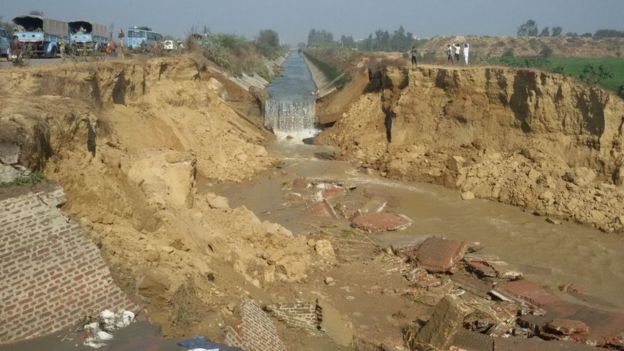 Image copyrightDelhi Jal Board
Image copyrightDelhi Jal Board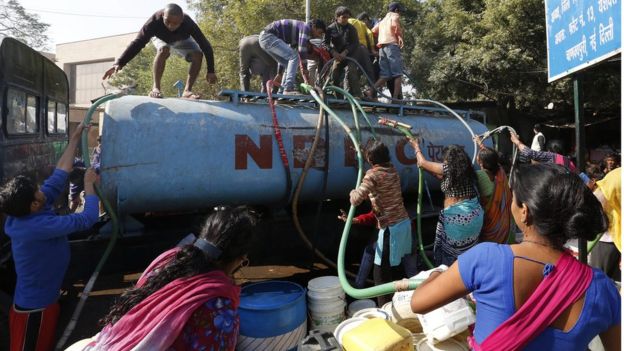 Image copyrightEPA
Image copyrightEPA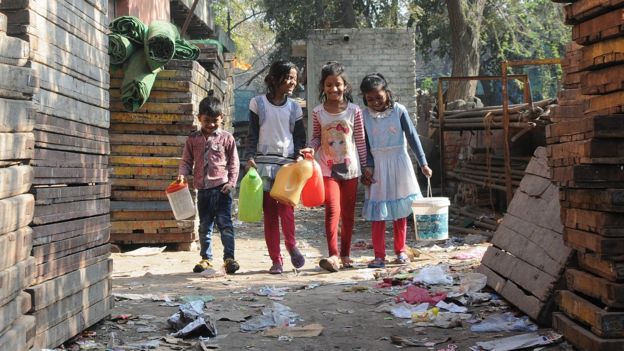 Image copyrightEPA
Image copyrightEPAWhy are the Jats angry?
- The land-owning Jat community is relatively affluent and has traditionally been seen as upper caste.
- They are mainly based in Haryana and seven other states in northern India.
- Comprising 27% of the voters in Haryana and dominating a third of the 90 state assembly seats, they are a politically influential community. Seven of the 10 chief ministers in Haryana have been Jats.
- The Jats are currently listed as upper caste but the demonstrators have been demanding inclusion in caste quotas for jobs and education opportunities that have been available to lower castes since 1991.
- In March 2014 the Congress-led national government said it would re-categorise Jats as Other Backward Castes (OBC), opening the way to government job quotas.
- But India's Supreme Court ruled in 2015 that the Jats were not a backward community.
- As jobs have dried up in the private sector and farming incomes have declined, the community has demanded the reinstatement of their backward caste status to enable them to secure government jobs.
